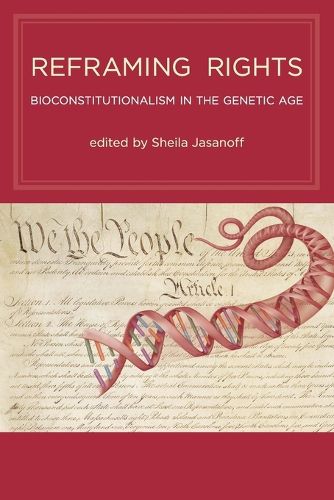Readings Newsletter
Become a Readings Member to make your shopping experience even easier.
Sign in or sign up for free!
You’re not far away from qualifying for FREE standard shipping within Australia
You’ve qualified for FREE standard shipping within Australia
The cart is loading…






Legal texts have been with us since the dawn of human history. Beginning in 1953, life too became textual. The discovery of the structure of DNA made it possible to represent the basic matter of life with permutations and combinations of four letters of the alphabet, A, T, C, and G. Since then, the biological and legal conceptions of life have been in constant, mutually constitutive interplay–the former focusing on life’s definition, the latter on life’s entitlements. Reframing Rights argues that this period of transformative change in law and the life sciences should be considered bioconstitutional. Reframing Rights explores the evolving relationship of biology, biotechnology, and law through a series of national and cross-national case studies. Sheila Jasanoff maps out the conceptual territory in a substantive editorial introduction, after which the contributors offer snapshots of developments at the frontiers of biotechnology and the law. Chapters examine such topics as national cloning and xenotransplant policies; the politics of stem cell research in Britain, Germany, and Italy; DNA profiling and DNA databases in criminal law; clinical trials in India and the United States; the GM crop controversy in Britain; and precautionary policymaking in the European Union. These cases demonstrate changes of constitutional significance in the relations among human bodies, selves, science, and the state.
$9.00 standard shipping within Australia
FREE standard shipping within Australia for orders over $100.00
Express & International shipping calculated at checkout
Stock availability can be subject to change without notice. We recommend calling the shop or contacting our online team to check availability of low stock items. Please see our Shopping Online page for more details.
Legal texts have been with us since the dawn of human history. Beginning in 1953, life too became textual. The discovery of the structure of DNA made it possible to represent the basic matter of life with permutations and combinations of four letters of the alphabet, A, T, C, and G. Since then, the biological and legal conceptions of life have been in constant, mutually constitutive interplay–the former focusing on life’s definition, the latter on life’s entitlements. Reframing Rights argues that this period of transformative change in law and the life sciences should be considered bioconstitutional. Reframing Rights explores the evolving relationship of biology, biotechnology, and law through a series of national and cross-national case studies. Sheila Jasanoff maps out the conceptual territory in a substantive editorial introduction, after which the contributors offer snapshots of developments at the frontiers of biotechnology and the law. Chapters examine such topics as national cloning and xenotransplant policies; the politics of stem cell research in Britain, Germany, and Italy; DNA profiling and DNA databases in criminal law; clinical trials in India and the United States; the GM crop controversy in Britain; and precautionary policymaking in the European Union. These cases demonstrate changes of constitutional significance in the relations among human bodies, selves, science, and the state.